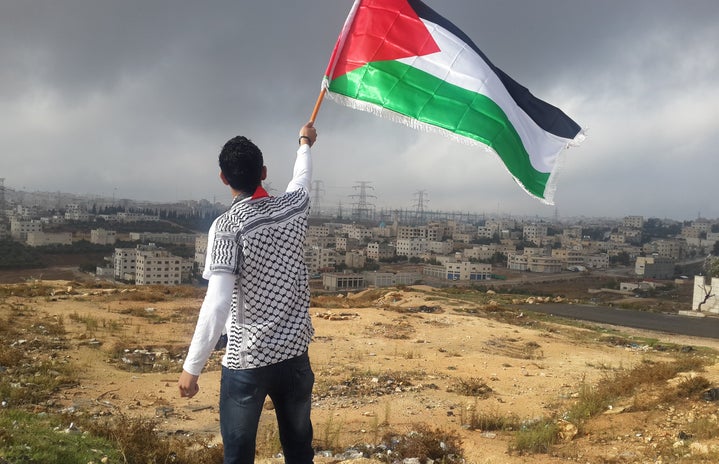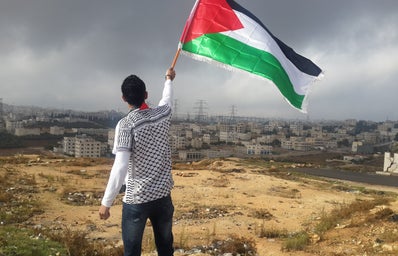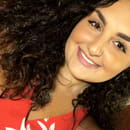The Palestinian/Israeli conflict is one that has been at the forefront of my life and sense of culture for as long as I can remember. It’s a conflict that has largely impacted my identity as a Palestinian woman and has shaped my family as a whole in numerous ways.
The Palestinian/Israeli conflict is extremely complex and is composed of multiple, historically disputed events. Essentially, the conflict has its roots in land ownership. The conflict began in the early 20th century, when Jews were fleeing persecution from other countries and wanted to establish a homeland. The Jews had the goal of establishing their homeland in what was then a majority Arab territory. One of the reasons why this territory was sought after by Jews is because they felt that they had a right to it due to the fact that they were promised land in their Torah. The promising of this land can be found in the Genesis section of the Torah in Genesis 12:1- ‘The Lord had said to Abraham, leave your country, your people and your father’s household and go to the land I will show you’ and in Genesis 12:7 – ‘The Lord appeared to Abraham and said “To your offspring I will give this land.” These divine “promises” of land found in the Torah and the Arab people’s sentiment that the land they lived on belonged to them, and only them, clashed greatly and many bloody, violent wars have ensued since. Multiple mandates have been put forth to “fairly” allocate the territory to both Israeli Jews and Palestinian Arabs, but the mandates have typically shown bias towards the Israelis, which has led to Arab citizens rightfully feeling forgotten and discriminated against. These feelings have led to numerous uprisings and fights for self-determination among the Palestinian people.
This brief historical overview of the Palestinian/Israeli conflict probably doesn’t give good insight as to how I am personally affected by the conflict. I think the best way for me to convey how I’ve been affected is to talk directly about how the conflict has shaped my identity. First and foremost, it’s no secret that we live in a society that perpetuates racist stereotypes of all kinds. Hispanic, black, white, Hispanic, Asian, Indian, and every other cultural group is subject to harmful stereotypes in our society. Things are hardly different for the Arab community, which is constantly blamed for acts of terrorism in America, even when that terrorism is done at the hands of completely different cultural groups. Feeling as though my culture is something to be feared in American society has previously made me hesitant to proudly profess my identity as a Palestinian woman.
Additionally, the Palestinian community has been consistently marginalized and treated unfairly even at the hands of American higher ups themselves. In 2016, the United States agreed to a military aid package for Israel worth over $38 billion over the next ten years. This aid package came after numerous events in the country by which Palestinian people were left murdered at the hands of Israelis. Eight years previous to this package, Israel launched a month-long invasion to prevent Hamas from carrying out further attacks. Hamas is a political, militant and ultimately extremist Islamist/Palestinian group that seeks to entirely replace Israel with a Palestinian state. The majority of Palestinian citizens do not agree with the goals of Hamas, but Gaza (a major Palestinian territory) is ultimately governed by the group, independently of the Palestinian Authority. In the month-long invasion, approximately 1,417 Palestinians were killed, the majority of them being innocent citizens. The Israelis themselves lost 13 men. The United States offering ginormous amounts of aid to the group that was already considerably better off and stronger (militarily and livelihood wise) seemed like a slap in the face to many Palestinians. Palestinian Americans, myself included, felt betrayed by the country that they love and ultimately respect. America is a country founded on freedom and constitutionality, and we expect those sentiments to be shown against all other countries, specifically those that pose no risk to America and ultimately are in desperate need of their assistance.
It’s difficult to grow up in a country where your culture is scorned at the societal and governmental level, while also trying to maintain a sense of love and pride for your identity.
As I’ve grown up, I’ve thankfully become more properly educated on the Palestinian/Israeli conflict, and that education has allowed me to understand the right of my people as well as the Jewish people to have a safe land that they can call their own. Unfortunately, it seems difficult to come to a resolution on how this can be done, taking into account the history of war, prejudice and general hate amongst the two groups. Fortunately, times are changing for the better in America itself and hopefully this change can extend to the Middle East as well. The positive change I’m referring to can be seen in acts of Palestinian/Jewish solidarity in which both groups rightfully fight for those that have been marginalized and abused at the hands of Israel’s higher ups.

This is a photo of my Tata (Arabic for grandmother) with her siblings and parents. The women in the photo can be seen wearing traditional Palestinian garb. My Tata is standing 5th from left to right.
Want to see more HCFSU? Be sure to like us on Facebook and follow us on Instagram, Twitter and Pinterest!




